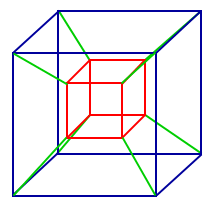You have seen that the harmonic series diverges. What about the sum of reciprocal squares? In fact, they converge, and to something very interesting:
SUMk=1 to infinity ( 1/k2 ) = ( Pi2/6 )
Where did that Pi come from, anyway?
If you liked that one, here are more:
SUMk=1 to infinity ( 1/k4 ) = ( Pi4/90 )
SUMk=1 to infinity ( 1/k6 ) = ( Pi6/945 )
SUMk=1 to infinity ( 1/k8 ) = ( Pi8/9450 )
SUMk=1 to infinity ( 1/k10 ) = ( Pi10/93,555 )
Presentation Suggestions:
This Fun Fact is short and fun for the class to ponder.
The Math Behind the Fact:
Little is known about sums of odd powers. It was recently shown (Apery) that the sum of the cubed reciprocals is irrational. The sums of reciprocal powers as you vary the power is a function known as the Riemann zeta function.
How to Cite this Page:
Su, Francis E., et al. “Sums of Reciprocal Powers.” Math Fun Facts. <http://www.math.hmc.edu/funfacts>.
References:
Math. Intelligencer article by van der Poorten, 78/79 MR 80i:10054
Fun Fact suggested by:
Lesley Ward

